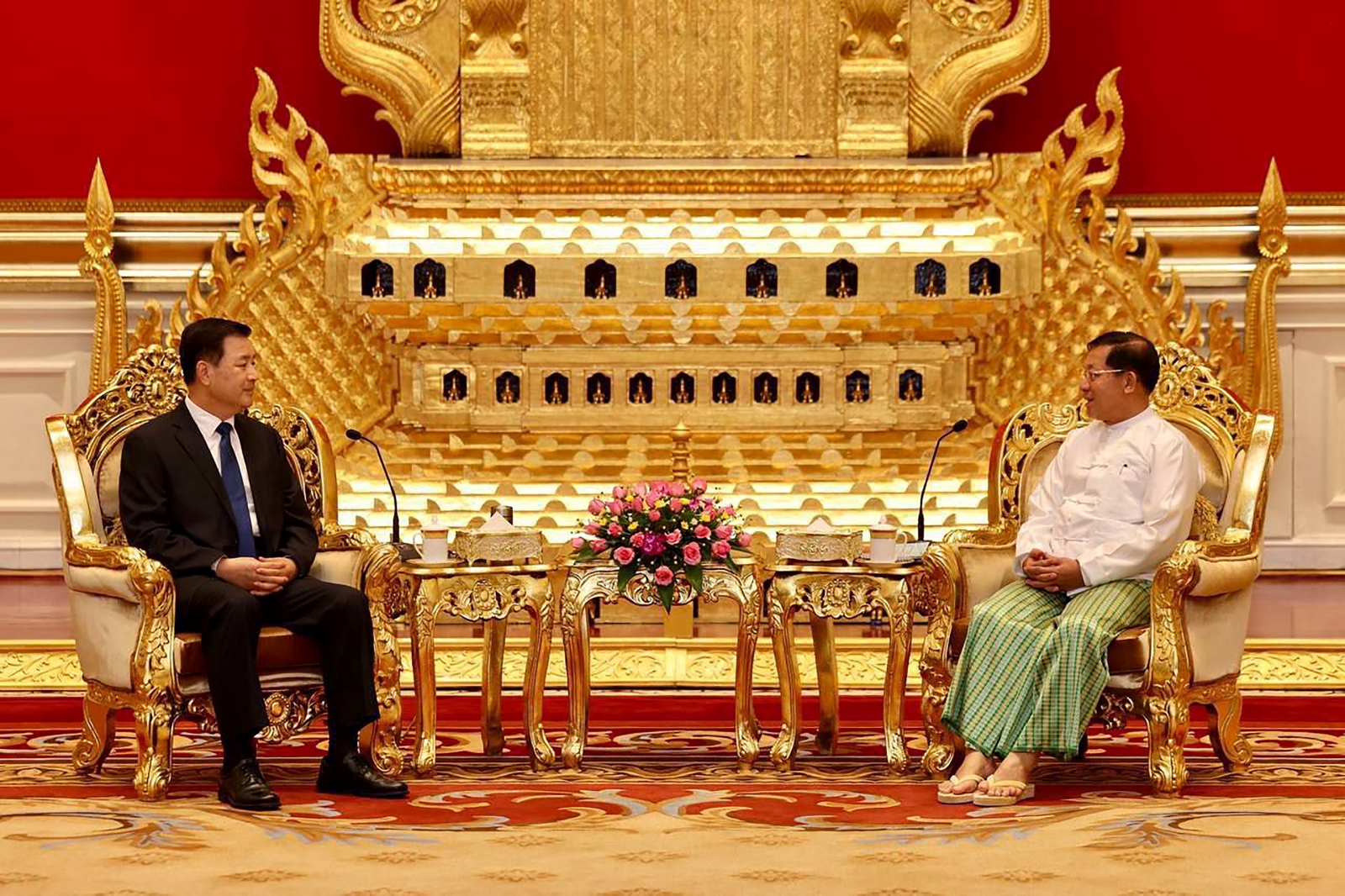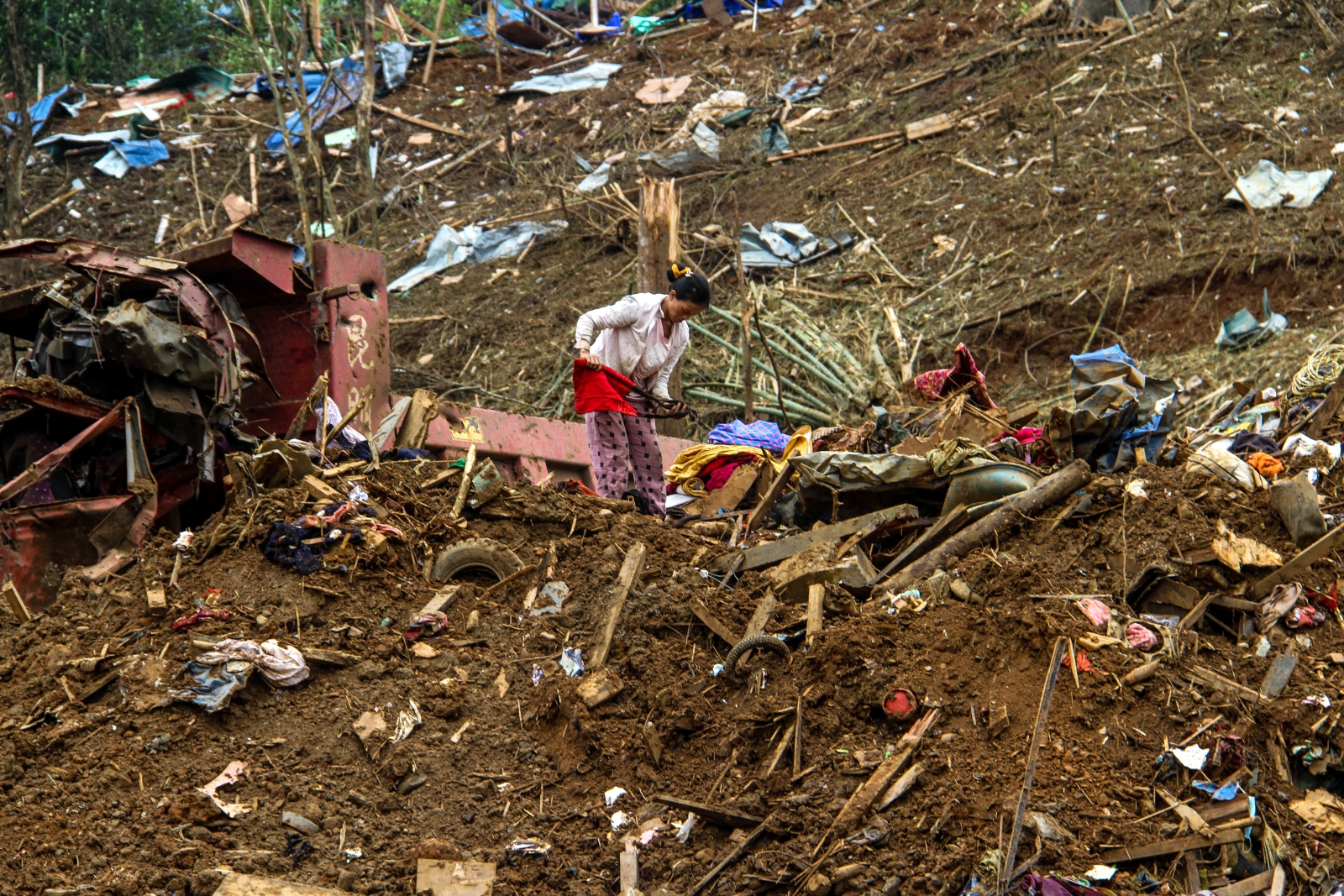Post-coup conflict and lawlessness are opening the door in Kachin State for unprecedented numbers of illegal Chinese traders to buy the world’s most highly prized jade directly from miners.
By FRONTIER
Zhang Li*, a Chinese jade buyer, told Frontier she bribed both the Myanmar military and the Kachin Independence Army in order to travel from China to Hpakant in May, via the Kan Pike Tee border crossing.
“I saw my driver give money to soldiers, but I’m not sure how much he gave each one. I paid him K6 million all at once, and he managed to go through all the checkpoints,” she said, now speaking from Myitkyina.
Hpakant Township, in Kachin State, is famous for its enormous jade mines, the source of the vast majority of the world’s precious imperial jade. Even before the 2021 coup, international NGO Global Witness estimated that 50-80 percent of the jade harvested in Myanmar was illegally smuggled to China. Now that estimate has risen to 90pc.
When the military seized power in February 2021, it sparked widespread conflict, a breakdown in rule of law and a surge in corruption. One effect is that it’s even easier for Chinese jade buyers to bribe their way into the country and buy jade directly from the source at discount prices.
“The Chinese come in and buy stones with no problems, and transport the jade back to China,” said Ko Awng Mai, a freelance miner known as a yemase. “It’s supposed to be restricted but the authorities don’t take real action.”
Yemase toil in extremely dangerous conditions, often clinging to the sides of cliffs to search through debris for chunks of jade missed by the bigger companies with heavy machinery. Sometimes they are buried under mountains of rock and rubble that once held the promise of fortunes. One of the worst landslides in Hpakant’s history killed at least 160 people in July 2020.
A review of TikTok, a popular Chinese social media platform, shows many videos of Chinese traders openly buying jade stones directly from yemase.
Ko Soe Aung*, a yemase from Magway Region, estimated to Frontier that half of the buyers in Hpakant are Chinese. He said they often show raw gemstones on social media to potential customers, and sell them for much higher prices than they purchase them.
“Let me give you an example,” said Soe Aung, who has worked in Hpakant for a decade and speaks Chinese. “If a Chinese buyer pays K100,000 (US$48) for a raw gemstone, they resell it for at least K500,000 to their customers. Freelance miners think they are making money from the Chinese, but really they are losing out.”
A squandered source of wealth
The multi-billion-dollar jade industry in Hpakant has long been a huge source of wealth, both for the elites of successive military regimes and for ethnic armed groups like the KIA, United Wa State Army and Arakan Army.
By law, foreigners can only buy gems and jade stones at officially sanctioned fairs in Mandalay and Nay Pyi Taw, but enormous quantities have been siphoned off for years in an environment of conflict, lawlessness and corruption.
After being elected in 2015, the National League for Democracy government attempted to reform the jade mining industry before it was ousted in the 2021 coup. Its suspension of jade licensing in 2016 gradually reduced licences to almost zero, but had the counterintuitive effect of encouraging a frenzy of mining.
“The licencing suspension instead allowed corruption to flourish and encouraged opposing armed groups to collaborate to mine jade faster and more dangerously than before,” said Global Witness.
The junta issued a verbal order in December 2021 to suspend all mining for jade and gems. This resulted in most mines halting operations in the ruby-rich Mogok area of Mandalay Region, where there is a strong military presence. But the order was largely ignored in the mixed-control Hpakant region.

While the yemase complain that Chinese buyers are taking advantage of them, buyers like Zhang Li allege that fraud and cheating are rampant in the mines.
“I don’t believe we’re getting such a good deal from the freelance miners,” she said. “Their raw stones are not worth the high prices they set. Cheating is very common in Hpakant, and we have to be careful.”
Ko Soe Moe, a yemase from Rakhine State, said Chinese buyers should be thankful because they avoid paying taxes by going directly to freelance miners and black-market traders.
“If they bought legally at the gem fairs, they would have to pay tax. That’s how our country has squandered lots of money. The military government is only concerned with power, not with people or natural resources,” he said.
Myanmar lacks a jade-processing industry that would allow it to turn rough gems into more valuable finished products. This process is entirely carried out in China, further driving down prices for Myanmar jade sellers.
“We ask a reasonable price,” said Soe Moe. Naturally we would like more money, but we understand that the buyers won’t pay as much as we want. Chinese or local, it doesn’t make a difference.”
Looking the other way
U Win Ye Tun, the regime’s spokesperson in Kachin State, denied to Frontier that soldiers and officials were taking bribes to allow foreigners in illegally. He said the regime would take action if residents provided evidence.
“We can’t take action without proof. There are many accusations against the military and government officials. As long as there’s no proof then we simply say it’s not true,” he said.
He insisted that authorities have been arresting and deporting foreigners who came to Hpakant illegally.
“We keep looking for illegal foreigners in Hpakant Township, and if they are found the local police will arrest them,” he said. “I can’t tell you how many illegal foreigners have been arrested in the last two years, but I can say that it’s a lot.”
But Hpakant residents say the presence of Chinese buyers is an open secret, and the regime turns a blind eye due to corruption.
U Seng Naung*, a Hpakant resident, told Frontier in July that local Myanmar-Chinese arrange accommodation for the illegal Chinese traders and help them to buy the gemstones. Buyers like Zhang Li also hire local Myanmar-Chinese interpreters to help them negotiate with yemase and black market dealers.
According to Seng Naung, this is done with the complicity of regime officials.
“They couldn’t come here if government officials, military and the Kachin Independence Army didn’t let them,” he said.
* indicates use of pseudonym for security reasons







